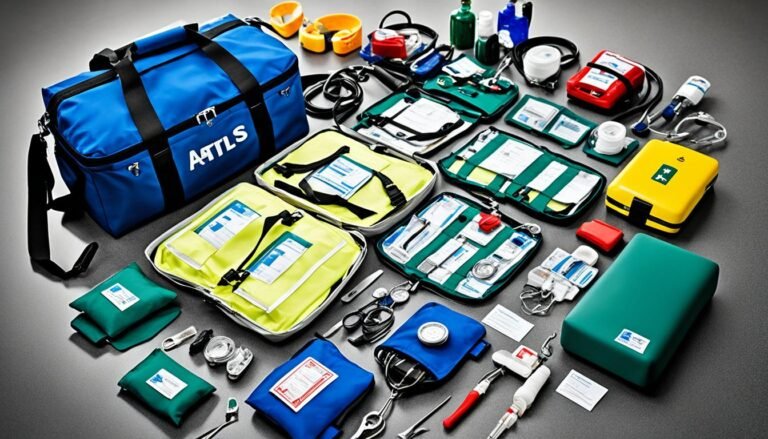What is a Certified Nurse Midwife (CNM)?
Certified Nurse Midwives (CNMs) take care of pregnant women from start to finish. They handle pregnancy through delivery and even postpartum care. As advanced nurses, CNMs are key in making sure women stay healthy. They provide many services like taking care of women’s health before birth, giving advice on birth control, and preventing health issues.
Versatile in their skills, CNMs can also be there for births that happen at home. Their knowledge and care ensure women have a good experience during birth. They also focus on women’s well-being across their lifetime.
Key Takeaways:
- Certified Nurse Midwives (CNMs) are advanced practice registered nurses who provide comprehensive care to pregnant women.
- CNMs offer a wide range of services, including antepartum care, gynecological care, and contraceptive management.
- CNMs can work in various healthcare settings, including hospitals, clinics, birthing centers, and attend home births.
- Their qualifications and expertise make CNMs an essential part of women’s healthcare, promoting positive birth experiences and enhancing overall well-being.
- Stay tuned to learn more about the journey to becoming a Certified Nurse Midwife (CNM) and their roles, responsibilities, education, salary, scope of practice, and the future outlook of this rewarding profession.
The Journey to Becoming a Certified Nurse Midwife (CNM)
Becoming a Certified Nurse Midwife (CNM) is a journey filled with steps. These include education, certification, and getting a license. They make sure that those hoping to become CNMs know how to provide full midwifery care.
The first step is becoming a registered nurse (RN). You need to finish a certified nursing program and pass the NCLEX-RN examination. Once you’re an RN, you can start your path towards becoming a CNM.
Next, you apply to an accredited nurse-midwifery program. These programs are at the graduate level and can be done either online or at a campus. You usually need a 3.0 GPA to apply. These programs give you special training and practical experience caring for pregnant women, newborns, and those in their reproductive years.
After finishing the program, you need to pass the AMCB Nurse-Midwifery/Midwifery examination by the American Midwifery Certification Board (AMCB). This test shows you’re ready to offer safe and effective care as a CNM. If you pass, you become a Certified Nurse Midwife.
Your CNM certification lasts for five years. You must keep up to date with new practices through continuing education. CNMs also need to get a state license to work legally as a CNM in their state. Each state has its rules for this.
Once you complete all these steps, you are a Certified Nurse Midwife. You’ll have the skills and knowledge to help women at any stage of their reproductive life. This includes care during pregnancy, childbirth, and afterward.
| Steps to Becoming a Certified Nurse Midwife (CNM) | Description |
|---|---|
| Step 1 | Complete an accredited nursing program and pass the NCLEX-RN examination to become a registered nurse (RN). |
| Step 2 | Apply to an accredited nurse-midwifery program, either online or on-campus, and complete the required coursework and clinical experiences. |
| Step 3 | Pass the AMCB Nurse-Midwifery/Midwifery examination to earn CNM certification. |
| Step 4 | Renew CNM certification every five years through continuing education. |
| Step 5 | Apply for state licensure to practice as a CNM in the chosen state. |
Certified Nurse Midwife (CNM) Roles and Responsibilities
Certified Nurse Midwives (CNMs) are vital in women’s healthcare. They offer a wide range of services. CNMs provide complete care across women’s reproductive lives.
They mainly care for pregnant women. This includes prenatal check-ups to ensure health. They help during labor and provide support for a safe birth. After birth, CNMs continue to help. They support breastfeeding, check the mother’s health, and advise on recovery and baby care.
CNMs also focus on gynecological care. They perform regular checks like pap smears. They diagnose and treat conditions. They also handle reproductive health. This involves giving advice on birth control.
“As a CNM, my goal is to empower women. I provide knowledge for informed choices about their health. I care for their physical, emotional, and mental health.”
– Jane Smith, CNM
CNMs are skilled at spotting and managing pregnancy and birth issues. They coordinate with other health experts. This is to ensure the best outcomes for mother and child. They also offer support and advice. This includes educating about childbirth and helping with mental health after birth.
In some places, CNMs can work alone or with doctors. This lets them care for women fully. They can order tests and give medicine for health issues.
State rules might change what CNMs can do. But generally, they work to care for women’s health in full.
Summary of CNM Roles and Responsibilities:
- Providing complete care to pregnant women
- Handling gynecological care and treatments
- Managing reproductive health, like birth control
- Spotting and managing pregnancy and birth problems
- Offering support and education to women and their families
- Working closely with others for full care
- Ordering tests and giving medicine, as allowed
CNMs are key in women’s health. They help women through all stages of life.
Certified Nurse Midwife (CNM) Education and Programs
If you want to be a Certified Nurse Midwife (CNM), you’ll need to complete an approved program. These are found at the graduate level and lead to either a Master of Science in Nursing (MSN) or a Doctor of Nursing Practice (DNP). They are overseen by the Accreditation Commission for Midwifery Education (ACME) to ensure quality.
The number of credits needed to graduate varies, between 30 and 80. The classes cover everything you need to know about midwifery. You’ll also get to work in healthcare settings to practice what you learn.
Online CNM programs are great for registered nurses (RNs) who need flexibility. You can learn while working and balancing your life. This is a big help for many who can’t attend traditional classes.
Benefits of Online CNM Programs
Online CNM programs let you learn when it’s best for you. You don’t have to be in a physical classroom. This freedom means you can study at your own speed, fitting it around your life.
“Online CNM programs offer working RNs the opportunity to advance their education in midwifery without disrupting their careers.”
These online courses also use fun tools like online forums and simulations. They help you work with other students, offering you support and chances to connect. This makes learning more interesting and collaborative.
Today, many more people have the chance to follow their midwifery dreams because of online education. It gives RNs the power to help women and their families by learning important midwifery skills.
Certified Nurse Midwife (CNM) Salary
Certified Nurse Midwives (CNMs) can earn a lot and find their work rewarding. The Bureau of Labor Statistics says the average CNM makes $55.55 an hour and $115,540 a year in the U.S.
The average hourly wage of a CNM is $55.55, while the average annual wage is $115,540.
Salaries for CNMs can change a lot. This is mostly based on their experience, where they work, and their location. For example, CNMs in California can make an average of $159,590 a year. In Utah, they earn about $133,680 annually.
Here’s a table to show you the average yearly pay for CNMs in specific states:
| State | Average Annual Wage |
|---|---|
| California | $159,590 |
| Utah | $133,680 |
| New York | $116,540 |
| Massachusetts | $115,280 |
| Texas | $108,810 |
Remember, pay can be different depending on where you work and the local cost of living. CNMs are very important in women’s health. Their salary shows how much their work is valued.
Next, we’ll look at what CNMs do and the rules they follow in their job.
Certified Nurse Midwife (CNM) Scope of Practice
Certified Nurse Midwives (CNMs) can practice in every US state and in the District of Columbia. They have the right to provide care. But, each place may have its own rules and guidelines for them.
CNMs can give full care, starting with prenatal to postpartum help for pregnant women. They also handle gynecological care and help women with family planning or preventive health. Depending on state rules, CNMs may work alone or with doctors.
Staying up-to-date with state laws is key for CNMs. This keeps their care top-notch and within the allowed scope. They make sure they can keep helping women at all stages of their reproductive health.
“The scope of practice for CNMs encompasses comprehensive care, ensuring that women receive the necessary support and guidance throughout their reproductive health journey.”
Benefits of Enrolling in a Certified Nurse Midwife (CNM) Program
Getting into a Certified Nurse Midwife (CNM) program has so many good points. It gives the right education and training to work as a CNM. This knowledge helps to give top care to women at all stages of their baby-having years.
Programs that get the thumbs up from the Accreditation Commission for Midwifery Education (ACME) are top-notch. They cover everything from prenatal to gynecological care. This means CNM students are well-prepped to offer thorough and fact-based care.
CNM programs are also known for being flexible. Students can pick if they want to go full or part-time, fitting their studies around life. This is super handy for RNs who want to beef up their midwifery skills without ditching their jobs.
Online CNM programs take flexibility even further. By being online, students can study from home or during breaks at work. This lets RNs keep up with their job while chasing their dream of being a CNM.
“Online CNM programs have allowed me to pursue my dream of becoming a midwife while still working full-time as a nurse. The flexibility and convenience offered by these programs have made my educational journey much more accessible and manageable.”
CNM programs also help set students up with the hands-on part of learning. They make sure each student gets a shot at real-world experience. This means getting to see and do midwifery care in a variety of places, with experienced guides.
| Benefits of Enrolling in a CNM Program |
|---|
| Comprehensive education and training in midwifery care |
| Accredited programs ensuring high-quality education |
| Flexible study options for working RNs |
| Online programs for convenient remote learning |
| Clinical placement support for hands-on experience |
Signing up for a CNM program helps future midwives in big ways. They learn what they need, and get practice, to start a great career in delivering babies. Whether it’s in a classroom or online, CNM programs are a rich journey that readies students for the amazing job of helping moms birth babies.
CNM vs. CM: Understanding the Differences
When talking about midwifery, Certified Nurse-Midwives (CNMs) and Certified Midwives (CMs) have clear differences. Knowing these differences is crucial for those interested in a career in midwifery. It helps with choosing the right educational route too.
CNMs have finished a proper nurse-midwifery program and are registered nurses (RNs). They have both RN and CNM certifications. In contrast, CMs do not start as registered nurses but have a background in healthcare. They’ve also finished a midwifery program and hold the CM certification.
Despite both being able to offer midwifery care and passing the same exam from the American Midwifery Certification Board (AMCB), their titles are different. CNMs get certified as RNs and CNMs. On the other hand, CMs get the CM certification.
The process to become a CNM or CM differs in terms of what’s needed for education and qualifications. For CNMs, it’s about finishing an accredited nurse-midwifery program as an RN. For CMs, it requires a healthcare-related degree or background and completing a midwifery program.
Knowing the distinctions between CNMs and CMs helps those looking to join the midwifery field. It equips them to choose the right path for their midwifery career.
The Role of a Certified Nurse Midwife (CNM) in Women’s Health
Certified Nurse Midwives (CNMs) are key in women’s health, caring for them across life stages. They are experts, guiding and supporting women from pregnancy through to motherhood.
During pregnancy, CNMs provide personal care, checking health and educating on prenatal health. They help with nutrition, exercise, and tackle concerns that pop up.
When it’s time for birth, CNMs are there, helping emotionally and medically. They manage normal birth processes and spot potential issues early. This helps ensure women have the birthing experience they prefer.
After birth, CNMs stay to help, making sure new moms get all the support needed. They handle physical and mental well-being and teach about caring for newborns and breastfeeding.
They also carry out gynecological check-ups, screenings, and offer birth control advice. Their focus is on keeping women healthy through preventive care, education, and support.
CNMs are dedicated to woman-centered care, understanding every woman’s story is different. They promote a supportive, informed, and choices-respecting environment.
CNMs team up with other health experts to deliver comprehensive care. They play a role in advocating for women’s health rights and policies supporting broad healthcare access for women.
By using their vast knowledge and kind helping, CNMs positively influence women’s health. They do more than just treat; they empower women to make healthy choices every step of the way.
The Future of Certified Nurse Midwives (CNMs)
The need for women’s healthcare is growing, which is good news for Certified Nurse Midwives (CNMs). CNMs are experts in caring for women. They help in many ways, from prenatal care to birth control.
More and more places are looking for skilled CNMs. This means there are more jobs out there. And CNMs can now do even more, like leading, doing research, and teaching.
CNMs can really make a difference in women’s health. They give women-centered care to improve health. CNMs also help women learn about their health so they can make smart choices.
Expanding Role of CNMs
- Leadership: CNMs can lead in health settings, making better care for women.
- Advocacy: They speak up for women’s health, helping to change healthcare laws.
- Research: CNMs help learn more about midwifery, which improves care for women.
- Education: They teach new midwives, sharing their wisdom to better future care.
As the world of healthcare changes, CNMs become more important. The future is bright for CNMs as they adapt to meet new needs of women.
| Key Factors | Future of CNMs |
|---|---|
| Career prospects | High demand and increasing employment opportunities |
| Scope of practice | Expanding roles in leadership, advocacy, research, and education |
| Impact on women’s health | Improving health outcomes and enhancing the quality of women’s healthcare services |
| Continued growth | Positive trajectory as the demand for women’s healthcare increases |
Conclusion
Certified Nurse Midwives, or CNMs, are key in improving women’s health. They offer complete care, starting with prenatal support and continuing to after birth. CNMs also look after women’s health throughout their lives, including care for gynecological issues and preventive health.
Becoming a CNM involves intense training in certified programs. After this, they must pass national exams and get a state license. CNMs are highly skilled. They can order tests, prescribe medicines, and offer primary care.
The work of CNMs leads to better birth outcomes and boosts women’s health. They help improve health care overall. With more women needing health services, CNMs are ready to step up. They are key to the future of health care.
FAQ
Q: What is a Certified Nurse Midwife (CNM)?
Q: What are the qualifications and education required to become a CNM?
Q: What are the roles and responsibilities of a CNM?
Q: What is the scope of practice for CNMs?
Q: What is the average salary of a CNM?
Q: What are the benefits of enrolling in a CNM program?
Q: What is the difference between a CNM and a Certified Midwife (CM)?
Q: What is the role of a CNM in women’s health?
Q: What is the future outlook for CNMs?
Source Links
- https://nursinglicensemap.com/advanced-practice-nursing/certified-nurse-midwife-cnm/
- https://www.midwife.org/the-credential-cnm-and-cm
- https://frontier.edu/what-is-a-certified-nurse-midwife/

Our Healthcare Editorial Team is composed of subject matter experts and seasoned healthcare consultants who bring decades of combined experience and a wealth of academic qualifications. With advanced degrees and certifications in various medical and healthcare management fields, they are dedicated to supporting the personal and career development of healthcare professionals. Their expertise spans clinical practice, healthcare policy, patient advocacy, and public health, allowing us to offer insightful, well-researched content that enhances professional growth and informs practice.
Disclaimer
The client education section of our blog is intended to support healthcare providers by offering informational resources for patient education. However, this information is not meant to serve as medical advice. We advise healthcare professionals to ensure all content is consistent with their clinical knowledge and confirm with current medical standards before using it in their practice or advising patients. For specific medical issues, always refer to professional guidance and standards of care.
For any legal matters or specific medical concerns, we strongly recommend consulting with a qualified legal professional or referring to government websites for authoritative information.







